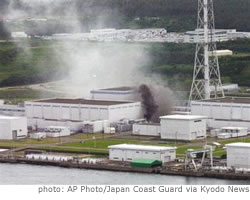 A 6.8-magnitude earthquake shook Japan on Monday. The quake caused a leak of radioactive water at the Kashiwazaki Kariwa nuclear power plant—and that should shake the rest of the world.
A 6.8-magnitude earthquake shook Japan on Monday. The quake caused a leak of radioactive water at the Kashiwazaki Kariwa nuclear power plant—and that should shake the rest of the world.
According to a report from the Associated Press (“Japan Quake Causes Nuke Plant Leak, Fire“), the power company that runs the nuclear plant initially announced that a fire in the plant had been put out with no damage to the reactor and no release of radioactive material. But later in the day, the company admitted that 315 gallons of water had spilled from a tank at one of the plant’s reactors and been flushed into the sea.
The leak of radioactive material—and especially the delay in reporting it—”fed fresh concerns about the safety of Japan’s 55 nuclear reactors, which supply 30 percent of the quake-prone country’s electricity and have suffered a long string of accidents and cover-ups,” according to the AP story. “The leak itself doesn’t sound significant as of yet, but the fact that it went unreported is a concern,” said Michael Mariotte, executive director of the U.S.-based Nuclear Information and Resource Service. “When a company begins by denying a problem, it makes you wonder if there’s another shoe to drop.”
The nuclear industry around the world has a long track record of denying problems, covering up accidents, and underplaying the dangers of nuclear power. If we fail to listen to the warnings in such small-scale accidents such as this week’s in Japan, we may very well be fated to learn by much more catastrophic means.
Jim Rice is editor of Sojourners magazine. See “ Is Nuclear Power the Answer?” in the current issue of Sojourners.

